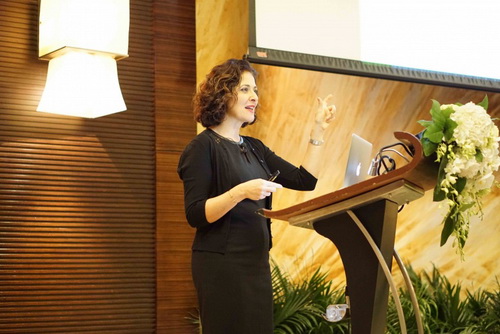As part of Ivy Education Group’s Distinguished Speaker Series, we listened in on Homa Tavangar’s talk about raising global citizens, based on her book: Growing up Global, Raising Children to be at Home in the World.
“Instead of asking your child, What do you want to be when you grow up? Ask, What problem do you want to solve today?“
Tavangar began her talk by defining global citizenship as “being at home in the world” and highlighting the reasons why as parents we should teach our children global culture as early as possible. A global mindset has become more necessary with globalization, the ever-changing world economy and politics, as well as increasing diversity both in our own neighborhoods and abroad.
She retold a story from 2003 (9/11) when she first identified a problem in adults: that they are too separated from the rest of the world. She realized that it is too late for adults to begin labeling themselves beyond the memberships of their neighborhoods, states, and countries, or to identify foreign cultures as anything but the “other”. When catastrophe strikes, instead of reaching out to the wider world for assistance, or having the moral imperative to provide assistance, the majority of adults would rather isolate themselves from the unknown in a bid for safety. She wanted to her children to grow up with knowledge of the world, rather than just terror or a fear for the unknown.
When Tavangar took her children to live and study in Africa for a semester, she witnessed how children can accept global citizenship, and how much they can benefit from the comfort of such new identities. Tavangar’s book, Growing up Global was written specifically for parents after having concluded that parents cannot ignore the effect of globalization on their children’s futures.

14 Ways To Grow A Globally Minded Child
Since the global mindset, which is similar to an entrepreneurial mindset, is a muscle that grows with practice, it’s better to start as early as possible! So let’s look at some ways a parent or a teacher can help raise global citizens:
- Use metaphors and analogies involving the natural world to teach children about variety, beauty and differences.
- Read world literature; books written by foreign authors, written about and in foreign countries, or perhaps by an author from your own country or region that is of a different culture than your family. Find a list here.
- Eat cuisine from all over the world and encourage children to try different foods from ethnic markets or restaurants.
- Attend cultural festivals; or if they’re unavailable in your region, then celebrate the cultural festival of distant lands.
- Learn about the traditions and rituals of other cultures and try enacting them at home.
- Play games and sports of other countries/cultures. Be inspired by this exhaustive list of 80 world games!
- Discover what foods are said to heal common health conditions in different cultures.
- Meet and talk to people from cultures other than your own to genuinely get to know them and befriend them!
- Listen to music from around the world (you can read lyric translations).
- Display a world map or a globe in a prominent place in your home and encourage exploration and conversations. Take your pick by searching for 世界地图 on Taobao.
- Learn a foreign language together! Have you heard of Mango?
- Watch a sports game narrated or hosted in another language.
- Talk about the origins and trading routes of products used every day in your home.
- Incorporate humanitarian work in your family life (kiva.org, ripple.org, etc.) as a means to both learn about life elsewhere, but teach your child the importance of service.
Take Global Baby Steps
Although this list can appear daunting to some parents, Tavangar emphasizes to start small—put away your devices, step away from technology, and spend time conversing with your child about the world.
Talk about world news, what day it is in another culture, an upcoming holiday/festival, and remind your child that there is a vast world outside your home and community. Instead of asking your child, “what do you want to be when you grow up?” Ask, “What problem do you want to solve today?” Or, “What challenge do you want to take?” Teach your child that all of us shoulder the future of the world, and every one of us, no matter how young, can make a difference!
Photo: Courtesy of Daystar Academy




